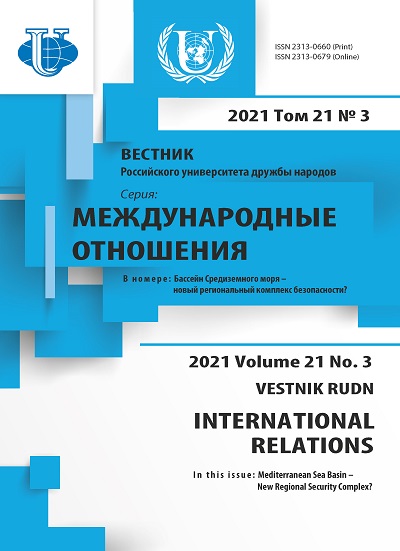Populism in the Foreign Policy of the Turkish Republic
- 作者: Avatkov V.A.1,2
-
隶属关系:
- Primakov National Research Institute of World Economy and International Relations, Russian Academy of Sciences
- Diplomatic Academy of the MFA of Russia
- 期: 卷 21, 编号 3 (2021): Mediterranean Sea Basin – New Regional Security Complex?
- 页面: 543-554
- 栏目: 世界和安全
- URL: https://journals.rudn.ru/international-relations/article/view/27449
- DOI: https://doi.org/10.22363/2313-0660-2021-21-3-543-554
如何引用文章
全文:
详细
The paper explores the role and peculiarities of the populism in the modern foreign policy of the Republic of Turkey. Populism became especially popular in Turkey’s foreign policy discourse when the Justice and Development Party came to power in 2002 and R.T. Erdoğan as President in 2014. Special attention is paid to R.T. Erdoğan’s populist statements made in the context of the key foreign policy ideologies - Neo-Ottomanism, Neo-Panturkism and Islamism. The propaganda of Neo-Ottoman ideas is aimed at restoring Turkey to its former Imperial greatness. The ultimate goal of Turkey’s populism in Turkic states is to form a new Turkish-centric subsystem of international relations - the “Turkic world”. Turkey’s Islamic populism within the country is primarily aimed at the conservative part of the population and at the world Islamic community on the international arena. The main task of such populism is the gradual abandonment of the principles of M.K. Ataturk and the secularism, as well as the formation of public opinion that Ankara is the center of the Islamic world. The author comes to the conclusion that Turkey’s populism is quite effective and assists the ruling elite in achieving its foreign policy goals. In many ways, the success of Turkey’s populism depends on the competent policy of its implementation by R.T. Erdoğan - a classic example of an Eastern politician with a charismatic type of leadership. However, the situation may change significantly in case of the power change in Turkey, emergence of a new leader and, consequently, new populist mechanisms.
作者简介
Vladimir Avatkov
Primakov National Research Institute of World Economy and International Relations, Russian Academy of Sciences; Diplomatic Academy of the MFA of Russia
编辑信件的主要联系方式.
Email: v.avatkov@gmail.com
ORCID iD: 0000-0002-6345-3782
PhD in Political Science, Senior Research Fellow, Center for post-Soviet studies, Primakov National Research Institute of World Economy and International Relations (IMEMO RAS); Associate Professor, Department of International Relations, Diplomatic Academy of the Ministry of Foreign Affairs of the Russian Federation
Moscow, Russian Federation参考
- Ataç, C. A. (2019). Pax Ottomanica no more! The “peace” discourse in Turkish foreign policy in the post-Davutoğlu era and the prolonged Syrian crisis. Digest of Middle East Studies, (1), 48—69. https://doi.org/10.1111/dome.12152
- Avatkov, V. A. (2017). Turkish identity crisis. Politics and Society, (4), 96—103. (In Russian). https://doi.org/10.7256/2454-0684.2017.4.19718
- Avatkov, V. A. (2019). Ideology and values in Turkey’s foreign policy. MGIMO Review of International Relations, 12(4), 113—129. (In Russian). https://doi.org/10.24833/2071-8160-2019-4-67-113-129
- Balcı, A. (2017). Türkiye Dış Politikası: İlkeler, Aktörler ve Uygulamalar. İstanbul: ALFA.
- Baran, Z. (2010). Torn country. Turkey between secularism and Islamism. Stanford: Hoover Institution Press.
- Glazova, A. V., Ivanenko, V. I., Kolesnikov, A. A., & Svistunova, I. A. (2015). Impact of the Arab Spring upon non-Arab countries in the Middle East. Russia and the Moslem world, (4), 94—117. (In Russian).
- Gromyko, A. A. (2016). New populism and the post-Cold War order in the making. Contemporary Europe, (6), 5—12. (In Russian). https://doi.org/10.15211/soveurope620160510
- Kireev, N. G. (2004). Turkey: What is in the luggage of the “moderate islam” party. Russia and the Moslem world, (8), 87—100. (In Russian).
- Lasswell, G. D. (1929). Propaganda technique in the World War. Moscow—Leningrad: Gosudarstvennoe izdatel’stvo publ. (In Russian).
- Mudde, C. (2004). The Populist zeitgeist. Government and Opposition, (4), 541—563. https://doi.org/10.1111/j.1477-7053.2004.00135.x
- Nadein-Raevskiy, V. A. (2017). R.T. Erdogan as an example of a charismatic politician. Outlines of Global Transformations: Politics, Economics, Law, 10(6), 138—151. (In Russian). https://doi.org/10.23932/2542-0240-2017-10-6-138-154
- Nadein-Raevskiy, V. A. (2020). Turkish policy in the Middle East. Pathways to Peace and Security, 1 (58), 139—156. (In Russian). https://doi.org/10.20542/2307-1494-2020-1-139-156
- Naumkin, V. (2019). The Kurdish conundrum of the Middle East (the case of Iraq). Mirovaya Ekonomika i Mezhdunarodnye Otnosheniya, 63(5), 76—87. https://doi.org/10.20542/0131-2227-2019-63-5-76-87
- Pechatnov, V. O. (2017). The Trump phenomenon and American democracy. Mezhdunarodnye Processy, 15(1), 13—34. (In Russian). https://doi.org/10.17994/IT.2017.15.1.48.3
- Savicheva, E. M. (2014). On geopolitical situation in the Middle East: Interaction between regional and global trends. Vestnik RUDN. International Relations, (1), 14—21. (In Russian).
- Shlykov, P. V. (2020). Between the US, the EU and Eurasia: Transformation of foreign policy priorities of Turkey. Current Problems of Europe, (1), 110—135. (In Russian). https://doi.org/10.31249/ape/2020.01.06
- Ulchenko, N. Yu. (2012). Socio-economical policy of Justice and Development Party of Turkey: From populism to popularity. Vostok. Afro-Aziatskie Obshchestva: Istoriia i Sovremennost, (3), 72—86. (In Russian).
- Ünal, M. (2018). AK Parti Döneminin Demokratikleşme Adımları. Kuruluşundan Bugüne AK Parti. Siyaset. İstanbul: SETA Kitapları.
- Vainshtein, G. I. (2017). Modern populism as a subject of political science. Polis. Political Studies, (4), 69—89. (In Russian). https://doi.org/10.17976/jpps/2017.04.06
- Voronin, S. A. (2014). Power is what is never enough. About the nature and typology of political leadership, types of political systems and regimes in the historical process. RUDN Journal of World History, (3), 32—57. (In In Russian).
- Weyland, K. (2013). Latin America’s authoritarian drift. The threat from the populist left. Journal of Democracy, (3), 18—32. https://doi.org/10.1353/jod.2013.0045
- Wuthrich, F. M., & Ingleby, M. (2020). The pushback against populism: Running on “radical love” in Turkey. Journal of Democracy, (2), 22—40. https://doi.org/10.1353/jod.2020.0034








